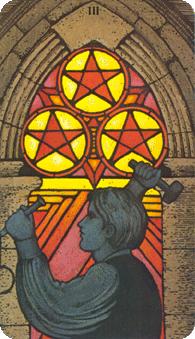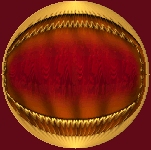3 of Coins: Proof
(c) Cheryl Lynne Bradley 2006-10

'The Word of God is not a sounding but a piercing Word, not pronounceable by the tongue but efficacious in the mind, not sensible to the ear but fascinating to the affection. His face is not an object possessing beauty of form; but rather, it is the source of all beauty and all form. It is not visible to the bodily eyes, but rejoices the eyes of the heart. And it is pleasing not because of the harmony of its color but by reason of the ardor of the love it excites.'
St. Bernard of Clairvaux, 1091-1153
"Fancies beyond the reach of understanding, and which have yet been made the objects of belief -- these have been the source of all the disputes, errors, and superstitions which have prevailed in the world. Such national mysteries cannot be made subservient to the right use of humanity."
Socrates
"To the man without understanding, the world is as it is. To the man with understanding, the world is as it is."
Zen Buddhist saying
"Science without religion is lame, religion without science is blind."
Albert Einstein
The 3 of Coins in the Tarot is a card of completion, community and connection. It is typically depicted with three people, two admiring the sculpted work of the third or offering their coins to him. This is sometimes called the card of the Master Craftsman and shows us that the apprentice or amateur has earned his recognition and can now move forward with their job, career or calling. They have earned and proven their worth and value in a physically or spiritually tangible way and are rewarded with approval and acceptance.
This card makes me think of proof. We have all heard the expression "the proof is in the pudding" and we have all proof read at one time or another. Photographers produce a proof from which clients, or themselves, will choose their finished product. Publishers produce a galley or a proof of a manuscript before the book is pressed. Mathematics and science are based on finding proofs that explain the mysteries of life. Psychics, as well as people who believe in God, are always skeptically, and often derisively, admonished to "prove it". This is misusing the term "proof" and forcing a position of justification of existence and beliefs, which is akin to forcing ones opinions onto others. Obviously, it is a parallel opinion and will find no common ground. The very meaning of "proof" implies that sufficient evidence has been provided that would enable those of us who do not necessarily share the same experiences and beliefs, are compelled to agree and acknowledge that a conclusion is both correct and accurate.
Please bear in mind that skeptics are also often atheists, so they don't embrace spiritual beliefs of any type. Atheists will often use Occam's Razor,"plurality should not be posited without necessity." or, for the sake of simplicity, "the simpler the explanation, the better", in arguing against the existence of God on the grounds that God is an unnecessary theory. They feel that everything can be explained without assuming the heavy burden of a Divine Being who could have made things a lot simpler since He was supposed to be omnipotent. It is worth mentioning that you can't prove a negative, you can't prove the existence of God, Gods or Goddesses but neither can you disprove it. It comes down to personal, anecdotal experience and belief, which falls outside the scope of science's need for empirical, repeatable, formulaic evidence as "proof". I think often skeptics fall into the category of Richard Dawken's Argument from Personal Incredulity, "if I don't believe it's true, then it can't be." There is a very large difference between a proof and a belief, or a disbelief.
The following is an ancient Hindu parable illustrating humanity's many attempts to define God.
"One day, five blind men decided to find out what an elephant "looked" like. Led to one, each man grabbed hold of whatever section of the animal he could, certain that what he had grabbed was the whole of the elephant itself.
The one holding onto the trunk thought for certain that the elephant must indeed be the shape of a wiggly snake and said so, but the one who had found an ear countered, insisting that the elephant's size was that of a palm leaf. With a firm grip on one of the elephant's legs, the third announced that the animal was actually like a tree trunk. "No," stated another, while patting the elephant's side, "this beast is truly the size of a wall."
Then the fifth, being the loudest and most impatient of the group, clasped the animal's tail and yelled, "Oh, my brothers, you are not only blind but crazy, for the elephant is the shape of a rope"
Proof can be an act of seduction, we can convince ourselves that something is true - ask anyone who is friends with someone who is co-dependent in their relationship or the five blind men checking out the elephant. We can take our gut feelings as "proof". We can accept the words of an authority figure as "proof" that something is so - but remember what Mom always said about "and if little Johnny jumped off the Brooklyn Bridge, would you do that too?". Proof can be an act of supplication - "oh please let it be true." or it can be an act of Divine Intervention - "it was a miracle". Sometimes we offer proof from a reference point we only vaguely remember, "I read it somewhere.....". We accept plausibility as proof - "sounds good, must be true". Proof can be an act of convenience, "It would be so nice if it were true, ..." or an act of the imagination, "I'll just pretend it's true.." or a complete accident, "Well, what have we here", and proof can be an act of deception, "I wasn't there but it must be true...".
We can be intimidated into accepting proof through humiliation, exhortation, exhaustion, assertation, necessity, fear of looking stupid, lack of time, lack of interest, confusion or poor analogies. We may accept things as proven because a majority of people hold that opinion or it is a generally held opinion - this is called manufactured consent. We can be baffled by logic through obfuscation or obscurity, inaccessibility, future reference, over simplification, and hasty overgeneralization. We often accept something as a proof because of the semantic weight of words used to convince us of the proof and the importance weighted on these words.
In reality, anything can be twisted into a proof. Remember the old adage, "For example is not proof."
It is not my intention to prove or disprove psychic phenomenon but more to put the whole issue of proof into a different light. The idea of proof is open to many interpretations and don't confuse proof with justification, elucidation, correctness or even a reasonable explanation. The next time someone insults you with a "Prove it..." tell them to "Disprove it..." because ultimately it all comes down to the very simple fact no one can a prove a negative except God. There is no satisfactory, scientific, empirical evidence that God exists or that He doesn't exist. Bottom line, it is a matter of perception and persuasion, we can't see what is absent only what is visually present, we only perceive and interpret from our own viewpoint and from the certainty of our knowledge, observations and experiences. Ultimately it comes down to enjoying the pudding.

















